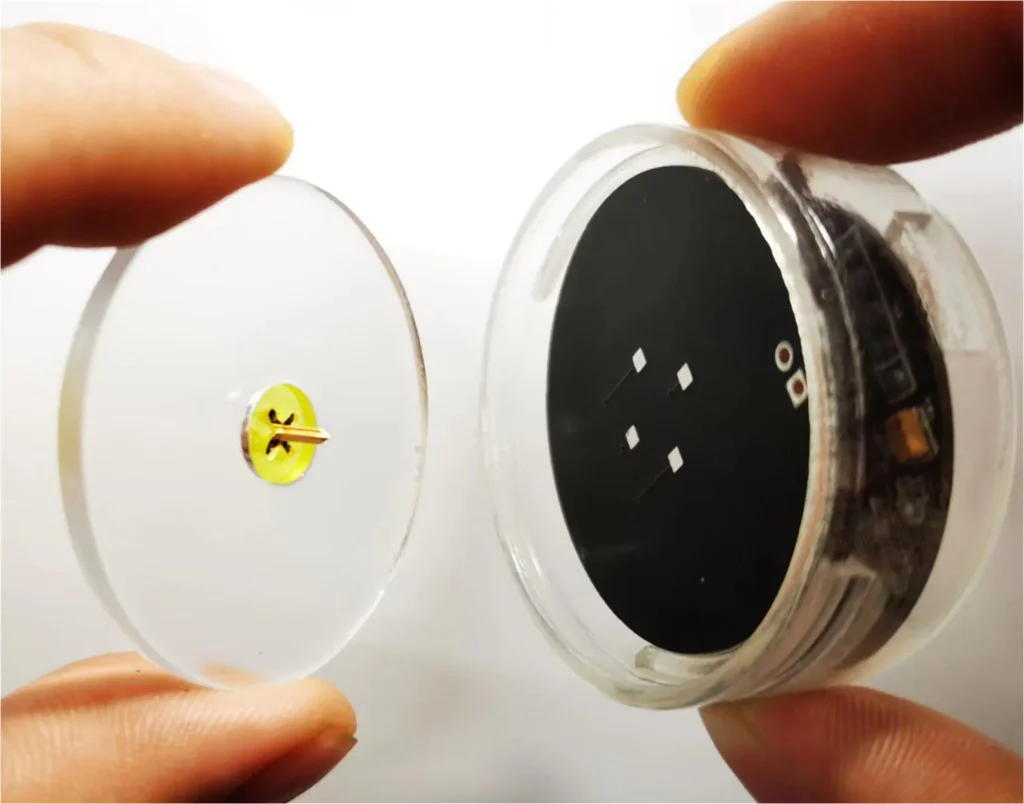A new wearable device developed by researchers at the Technion–Israel Institute of Technology and Sun Yat-sen University in China could redefine how diabetes is monitored and treated. The system uses a microneedle-based patch to continuously track both glucose levels and the concentration of metformin—a common diabetes medication—through the skin’s interstitial fluid. It then uses this data to guide real-time, personalized drug dosing via a connected smartphone app. The result is a closed-loop platform that combines painless monitoring with intelligent treatment recommendations, offering a major leap toward precision medicine for chronic disease.
The patch itself is built from 3D-printed microneedles embedded with nanoenzyme sensors. These sensors detect biomarkers without penetrating deep into the skin, making the process noninvasive and comfortable for long-term wear. Once applied, the microneedles continuously measure glucose and metformin levels and transmit the data via Bluetooth to a mobile app. The app performs pharmacokinetic and pharmacodynamic analyses, generating individualized drug profiles and dosage suggestions. Alerts are sent to users or caregivers when significant changes occur, helping prevent dangerous conditions like hypoglycemia or lactic acidosis.
In preclinical studies, the system was validated both in vitro and in vivo. Tests on diabetic mice showed strong correlation with conventional methods like ELISA and glucose meters, and the patch detected fluctuations that standard tools missed. The researchers also used the system to build personalized pharmacokinetic models, demonstrating how the same dose of metformin affected individuals differently based on age, weight, and metabolism. This capability could help clinicians fine-tune treatment plans and avoid adverse effects.
The innovation addresses several long-standing challenges in diabetes care. Traditional monitoring methods are invasive, painful, and episodic, while most treatments follow a one-size-fits-all approach that ignores individual variability. By offering continuous, real-time data and adaptive dosing, the Technion system enables dynamic disease management tailored to each user’s physiology. It also aligns with broader trends in wearable health tech, combining biosensors, AI, and mobile connectivity into a compact, user-friendly format.
Lead researcher Professor Hossam Haick describes the platform as a “new chapter” in chronic disease care. The team envisions expanding the technology to other conditions with narrow therapeutic windows, such as epilepsy or cardiovascular disease, by adjusting the sensing chemistry. Co-author Professor Changqing Yi adds that the system brings us closer to an era where wearables not only monitor health but actively guide treatment.
Article from Technion - Israel Institute of Technology: Painless Breakthrough in Diabetes Care: Smarter Monitoring and Drug Delivery
Abstract in Nature Communications: Microneedle-based integrated pharmacokinetic and pharmacodynamic evaluation platform for personalized medicine

